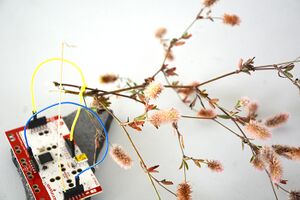Rare Endophyte Collectors Club: Difference between revisions
No edit summary |
m (Text replacement - "{{#ev:youtube\|(.*)}}" to "<htmltag tagname="iframe" width="1080" height="720" frameborder="no" src="https://www.youtube.com/embed/$1"></htmltag> ") |
||
| (9 intermediate revisions by 3 users not shown) | |||
| Line 1: | Line 1: | ||
{{Event | {{Event | ||
|Name=Rare | |Name=Rare Endophyte Collectors Club | ||
|Location=De Ruimte | |Location=De Ruimte | ||
|Date=2017/08/ | |Date=2017/08/08-2017/08/09 | ||
|Time=10:00-18:00 | |Time=10:00-18:00 | ||
|PeopleOrganisations=The Center for Genomic Gastronomy | |PeopleOrganisations=The Center for Genomic Gastronomy | ||
| Line 9: | Line 9: | ||
|Print=No | |Print=No | ||
}} | }} | ||
At the Rare Endophyte Collectors Club (RECC) [[The Center for Genomic Gastronomy]] | At the Rare Endophyte Collectors Club (RECC) [[The Center for Genomic Gastronomy]] invited biological hobbyists to meet and identify, discover, discuss and trade information about new, rare and hard to access microorganisms. The race went on: who got to unlock, collect and share the secrets of the microbiome era? | ||
Members of the Rare Endophyte Collectors Club | Members of the Rare Endophyte Collectors Club got their hands dirty (actually clean, because that’s a lab environement) and try biotechnology. During each installment of the club, participants collected plants to culture the microbes that live inside them, search for endophytes and then produce a zine, covering their process and various points of view on open-source/patented biological processes and imagining different future scenarios. | ||
Endophytes are the microorganisms, especially fungi, that live inside of plants. The relationship between an endophyte and its host plant is not well understood, but some of these microorganisms are believed to enhance host growth and nutrient acquisition, as well as improve the plant’s ability to tolerate abiotic stresses. Researchers around the world are isolating novel endophytes to investigate their potential agricultural or even pharmaceutical applications. | |||
[[File:Endophyte1.jpg|thumb]] | |||
For the H&D Summer Academy RECC came as a 2 day lab where participants learned how to collect agricultural plant samples (leaf, roots, etc.) and plate, grow, isolate and identify the microorganisms that grow inside the plants (Endophytes). The goal of the lab was to discover an entirely new organism and to take this DIY Bio research forward and to prototype its promise and limitations. | |||
Applied endophyte research is being promoted as a possible replacement for chemical fertilizers and pesticides. In addition to learning basic biological lab techniques, we have been able to imagine different food futures and various registers and modes of biohacking. | |||
==Outcome== | |||
As a part of HDSA2017 RECC has produced a collective work, consisting of an endophyte collection and a zine. | |||
<gallery> | |||
Endophyte8.jpg | |||
Endophyte9.jpg | |||
Endophyte10.jpg | |||
Endophyte2.jpg | |||
Endophyte3.jpg | |||
Endophyte4.jpg | |||
Endophyte5.jpg | |||
Endophyte6.jpg | |||
Endophyte7.jpg | |||
</gallery> | |||
<htmltag tagname="iframe" width="1080" height="720" frameborder="no" src="https://www.youtube.com/embed/SB3PytS2QG0"></htmltag> | |||
Latest revision as of 12:35, 31 January 2024
| Rare Endophyte Collectors Club | |
|---|---|
| Name | Rare Endophyte Collectors Club |
| Location | De Ruimte |
| Date | 2017/08/08-2017/08/09 |
| Time | 10:00-18:00 |
| PeopleOrganisations | The Center for Genomic Gastronomy |
| Type | HDSA2017 |
| Web | Yes |
| No | |
At the Rare Endophyte Collectors Club (RECC) The Center for Genomic Gastronomy invited biological hobbyists to meet and identify, discover, discuss and trade information about new, rare and hard to access microorganisms. The race went on: who got to unlock, collect and share the secrets of the microbiome era?
Members of the Rare Endophyte Collectors Club got their hands dirty (actually clean, because that’s a lab environement) and try biotechnology. During each installment of the club, participants collected plants to culture the microbes that live inside them, search for endophytes and then produce a zine, covering their process and various points of view on open-source/patented biological processes and imagining different future scenarios.
Endophytes are the microorganisms, especially fungi, that live inside of plants. The relationship between an endophyte and its host plant is not well understood, but some of these microorganisms are believed to enhance host growth and nutrient acquisition, as well as improve the plant’s ability to tolerate abiotic stresses. Researchers around the world are isolating novel endophytes to investigate their potential agricultural or even pharmaceutical applications.
For the H&D Summer Academy RECC came as a 2 day lab where participants learned how to collect agricultural plant samples (leaf, roots, etc.) and plate, grow, isolate and identify the microorganisms that grow inside the plants (Endophytes). The goal of the lab was to discover an entirely new organism and to take this DIY Bio research forward and to prototype its promise and limitations.
Applied endophyte research is being promoted as a possible replacement for chemical fertilizers and pesticides. In addition to learning basic biological lab techniques, we have been able to imagine different food futures and various registers and modes of biohacking.
Outcome
As a part of HDSA2017 RECC has produced a collective work, consisting of an endophyte collection and a zine.
<eplite src="https://etherpad.hackersanddesigners.nl/p/" id="RECC" height="1000px" width="1000px" />









